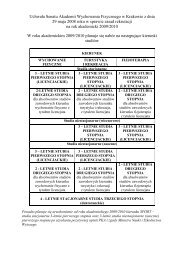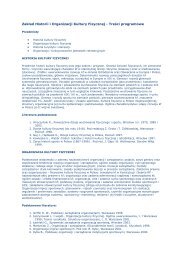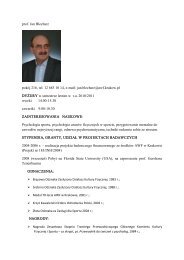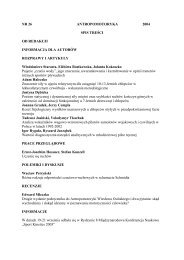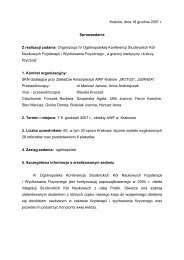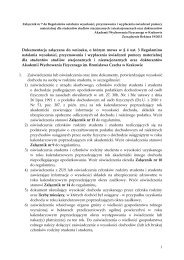Ability to self-control in the context of physical activity in schoolchildren at the age 10–11Table 4. The correlation of personal qualities significant for self-control and the self-control behaviour models in terms of genderPersonal qualities significant forself-control and the self-controlbehaviour modelsSpearman’s correlation coefficientGenderStatistical significancep** Self-confident –0.288 p = 0.004*** Tolerant –0.227 p = 0.024*** I am resourcefuland self-confident–0.249 p = 0.014** I quickly respond to remarks –0.277 p = 0.006* I know the rules of behaviourI have to observe, and I observethem–0.417 p = 0.000Note: * – level of significance p ≤ 0.001; ** – level of significance p ≤ 0.01; *** – level of significance p ≤ 0.05.DiscussionGeneralising the discussed problem it can be stated thatthe abilities of self-control of primary learners have notbeen investigated extensively. The researches on peculiaritiesof self-control abilities have been carried out butnot during the lessons of physical training. The worksof some authors analyse self-control not as social behaviourof primary learners but from the perspective ofother various (disabled, delinquent) social groups [20].A considerable attention is paid to the researches onsocial skills (moral, situational, essential, competition) ofsports athletes and senior school learners actively involvedin sports [11, 12, 13] as well as to the studies onpeculiarities of their self-regulation and self-control [21,14]. According to the researches of other authors [22,23] the programme of psychological training can be efficientlyapplied for the development of self-control skills;however, these researches were conducted on high proficiencyathletes and the works on development of selfcontrolskills at junior school age are scarce.Ringio and Friedman [18, 19], Malinauskas [24],Šniras, Malinauskas [25] conducted similar researcheson self-control but they investigated self-control ina broader context of essential social skills. Since essentialsocial skills are perceived as automated abilities,it is obvious that school learners are able to developand enhance them.Self-control is the main aspect of human functionand the main component of human behaviour invarious cultures. The research on pre-school childrencarried out by Chinese scientists [26] allowed for comparisonof children’s abilities to self-dependent controltheir behaviour in Western and Eastern cultures. Otherscientists [27, 29] revealed the researches on primarylearners’ self-control, which cannot be interpreted ascorresponding to our data because their analysis isfocused on other aspects of self-control. Though selfcontrolhas been the focus of researches for a longtime, very few measurement instruments to evaluatechildren’s self-control tendencies and behaviour havebeen created.Ceccini, Montero et al. [10] investigated the influenceof schoolchildren’s personal and social responsibilityon self-control and participation in games accordingto the rules following the model by Hellison [28].Thanks to intervention programme the experimentalgroup improved their personal feedback, delayed satisfaction,self-control and processes of self-regulation;the values of personal and social responsibility due tosatisfaction and sport mastery increased and simultaneouslya decrease in values of variables related to a wishto win, rough play, contact faults and bad mastery wasobserved. Above mentioned proves that school age isfavourable for development of self-control skills particularlythrough physical activity.The research on children from 10–11 years of ageproved the usefulness of self-control for learning to performa movement [29, 16]: children had to decide ontheir own when the best time for finding out the resultsof performance was. The research results assuredthat older children better understood the importance ofself-control for knowing the results to the process oflearning to perform a movement. According to the dataof our research, the influence of self-control on knowledgeand abilities was not established.– 91 –
Vytė Kontautienė, Audronius VilkasThe research under discussion was based on thestructure of self-control abilities applied in the scienceof sports [3]. Some authors present comparatively differentinterpretations of self-control: Lanc et al. [27]perceive self-control as a double phenomenon, i.e., asan ability to appropriately receive and provide feedbackto an adult or a peer, maintaining positive personal responsesystem through these interactions. Childrenpossessing self-control skills may gain trust of theirpeers because it allows foreseeing a subset of positiveanswers in various stimulating situations. The researchin question confirmed the significance of self--confidence to self-control skills. Other authors [26],following the structure of self-control skills developedby Kendall and Wilcox, define it as a comparatively consistenttendency of self-command from the cognitive(legal) and behavioural (executive) aspects. Cognitiveaspects include deliberation, solution to problems,planning and evaluation, which make a child to behavenot in an impulsive way. Abilities to consider, to conductthe chosen behaviour or not to behave in an undesirableway are ascribed to components of behaviour. Inour research the scale of self-control behaviour mo delswas also applied for evaluation of the expression ofself-control skills, which emphasised not an impulsivebut well-balanced behaviour. These different structuresof self-control confirm that this phenomenon is verycomplicated and its various aspects may be chosen forits evaluation.Self-control skills create possibilities for timely identificationof negative changes in the body and preventfrom negative consequences. Statistically significantdifference in opinion of the boys and girls about whentheir self-control fails was revealed. Similar data werereceived by Chinese scientists [26], who establishedthat girls are more capable of controlling themselvescompared to boys. It was also revealed that children,who grew without brothers or sisters, were more irritable,less controlled themselves and were less concernedabout daily activities compared to children whogrew in the family not alone.Traditionally self-control was considered to be a personaltrait such as the power of will. Such personalityfeatures as self-confidence, orderliness, punctuality, diligence,determination are linked to self-control as wellas with values and virtues [30, 31]. Self-control is relatedto persistence, initiative, courage, determination,an ability to foresee, self-dependence and patience. Theresearches on adolescents’ spiritual values show thatthey acknowledge values that embody the good (honesty,sensitivity, dignity) best, whereas the values thatrequire self-control (devotion to work, self-respect andrespect for others, non-compliance with negligence)are evaluated worse [30, 13]. Primary learners livingin towns find such values as self-confidence, honesty,joviality the most important, primary learners from thecentres of districts evaluate sympathy, friendliness, politenesshighest, whereas learners from rural areas seefriendliness, respect for others and politeness as themost relevant. All the values are weaker linked with self--control. The scale of self-control behaviour models usedfor evaluation of self-control abilities expression showedthat there exists a link between personal qualities relevantto self-control and self-control behaviour modelsbut its substantiation requires further researches.Self-control opens up new perspectives in physicaleducation not only to follow, organise but also tocorrect the health condition, physical fitness, physicaldevelopment, psychical states, emotions and to orientin changes of own body. This is provided for in theGeneral curriculum framework for primary and basiceducation [1] which points out that physical activitystimulates an ability to adapt to continuously changingconditions and requirements, it also creates conditionsto recognize own individuality, to develop physicaland spiritual endurance, self-control abilities, whichwill be necessary in various critical life situations. Thelinks between physical self-development and psychicalhealth in school learners at the age from 14–16 wereconfirmed by the researcher [32, 23]. It was establishedthat physical self-development has a positive effect onpsychical health because a statistically relevant (p
- Page 1 and 2:
Vol. 20, nr 51INDEX COPERNICUSCRACO
- Page 3 and 4:
KOMITET REHABILITACJI, KULTURY FIZY
- Page 5 and 6:
ANTROPOMOTORYKAISSN 1731-0652KOMITE
- Page 7 and 8:
NR 51 AN TRO PO MO TO RY KA2010SPIS
- Page 9 and 10:
From Editorsconvenient way, in comp
- Page 11 and 12:
Information for the AuthorsExamples
- Page 13 and 14:
Informacje dla Autorówscripts sub
- Page 16 and 17:
NR 51 2010AN TRO PO MO TO RY KAREAC
- Page 18 and 19:
Reaction time, movement time and EM
- Page 20 and 21:
Reaction time, movement time and EM
- Page 22 and 23:
Reaction time, movement time and EM
- Page 24:
Reaction time, movement time and EM
- Page 27 and 28:
Adam Kawczyński, Dariusz Mroczek,
- Page 29 and 30:
Adam Kawczyński, Dariusz Mroczek,
- Page 31 and 32:
Adam Kawczyński, Dariusz Mroczek,
- Page 33 and 34:
Edward Mleczko, Jerzy JanuszewskiMa
- Page 35 and 36:
Edward Mleczko, Jerzy Januszewskise
- Page 37 and 38:
Edward Mleczko, Jerzy JanuszewskiTa
- Page 39 and 40:
Edward Mleczko, Jerzy JanuszewskiTa
- Page 41 and 42: Edward Mleczko, Jerzy Januszewskian
- Page 43 and 44: A. Tyka, T. Pałka, A. Tyka, T. Cis
- Page 45 and 46: A. Tyka, T. Pałka, A. Tyka, T. Cis
- Page 47 and 48: Igor Stirnciała. Poza tym brano po
- Page 49 and 50: Igor Stirntioned behind the net of
- Page 51 and 52: Igor Stirnagainst each other, using
- Page 54 and 55: NR 51 2010AN TRO PO MO TO RY KATHE
- Page 56 and 57: The rank of one-on-one duels based
- Page 58 and 59: The rank of one-on-one duels based
- Page 60 and 61: The rank of one-on-one duels based
- Page 62 and 63: NR 51 2010AN TRO PO MO TO RY KATHE
- Page 64 and 65: The influence of physical effort in
- Page 66 and 67: The influence of physical effort in
- Page 68 and 69: The influence of physical effort in
- Page 70 and 71: NR 51 2010AN TRO PO MO TO RY KATHE
- Page 72 and 73: The physiological cost of walking i
- Page 74 and 75: The physiological cost of walking i
- Page 76 and 77: The physiological cost of walking i
- Page 78 and 79: The physiological cost of walking i
- Page 80 and 81: NR 51 2010AN TRO PO MO TO RY KAPHYS
- Page 82 and 83: Physical fitness progression in wom
- Page 84 and 85: Physical fitness progression in wom
- Page 86: Physical fitness progression in wom
- Page 89 and 90: Vytė Kontautienė, Audronius Vilka
- Page 91: Vytė Kontautienė, Audronius Vilka
- Page 95 and 96: Vytė Kontautienė, Audronius Vilka
- Page 98 and 99: NR 51 2010AN TRO PO MO TO RY KAPUBE
- Page 100 and 101: Puberty phase in girls - key questi
- Page 102 and 103: Puberty phase in girls - key questi
- Page 104 and 105: Puberty phase in girls - key questi
- Page 106 and 107: Puberty phase in girls - key questi
- Page 108: Puberty phase in girls - key questi
- Page 112 and 113: NR 51 2010AN TRO PO MO TO RY KAMY R
- Page 114 and 115: My review on the 6th World Ageing &
- Page 116: My review on the 6th World Ageing &


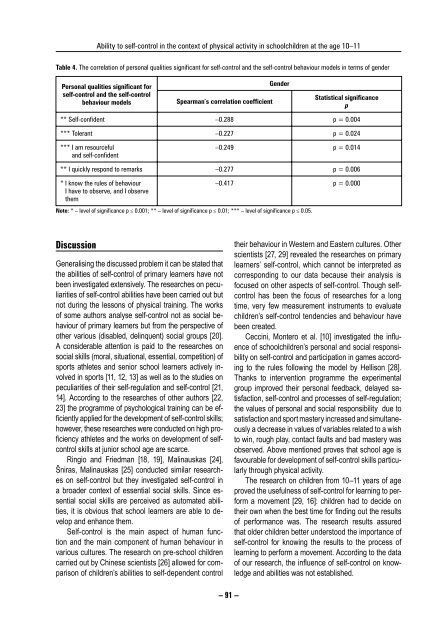
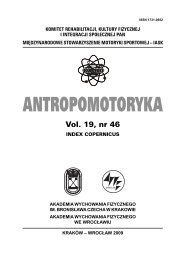
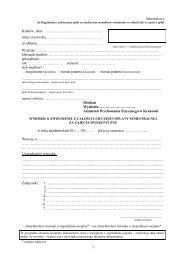
![Antropomotoryka nr 57 [2012]. - Akademia Wychowania Fizycznego ...](https://img.yumpu.com/50213388/1/182x260/antropomotoryka-nr-57-2012-akademia-wychowania-fizycznego-.jpg?quality=85)
